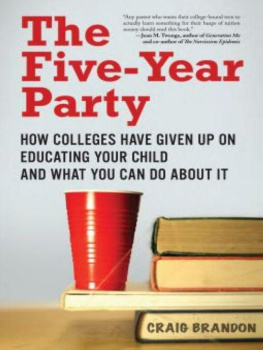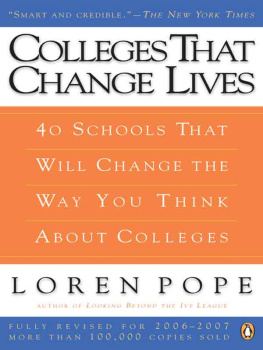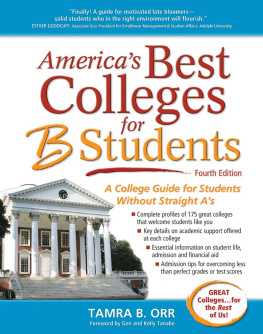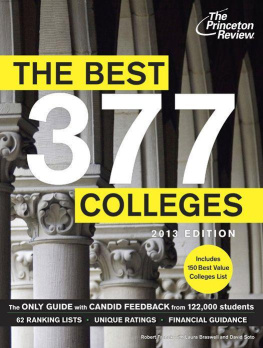Table of Contents
Praise for The Five-Year Party
High costs and debt, insufficient instruction, dangerous campuses, and poor job prospects: for too many students, a five-year college party often turns into a lifelong nightmare. The Five-Year Party is packed with illuminating stories and details about this crisis situation, and helps readers to avoid the dangers and get the most for their money.
Marc Scheer, Author, No Sucker Left Behind: Avoiding the Great College Rip-Off
In one dismaying and maddening episode and circumstance after another, Craig Brandons survey of college campuses sounds a vital warning for parents: The institutions and administrators you trust to foster and guide your childrens formation are more interested in their pocketbooks than their intellects. Buyer beware!
Mark Bauerlein, Author of The Dumbest Generation: How the Digital Age Stupefies Young Americans and Jeopardizes Our Future and Professor of English, Emory University
After reading only a few pages of The Five-Year Party , I immediately started telling people about its important message. This crucial book exposes the consumer mentality now all too prevalent on college campuses, detailing how higher education has given students what they want at the expense of giving them what they need to compete in the global marketplace. Even better, the book tells parents and educators how this nefarious trend can be circumvented. Any parent who wants their college-bound teen to actually learn something for their heaps of tuition money should read this book.
Jean M. Twenge, Author of Generation Me and Co-Author of The Narcissism Epidemic and Professor of Psychology, San Diego State University
With broad, unforgiving strokes, Craig Brandon paints a dark picture of residential college life that will give every parent pause before sending a child off to any of his Party Schools.
Barrett Seaman, Author of Binge: Campus Life in an Age of Disconnection and Excess
To my granddaughter, Charlotte Claire Brandon Anthony: May you never have to endure the terrors of a party school.
Introduction
M y first inkling that something had gone seriously hay-wire in higher education came just after the turn of the millennium, when I was asked to take over the job of advisor to the campus radio station. I had spent the previous five years as a full-time journalism instructor and advisor to the student newspaper at Keene State College in New Hampshire, but I knew very little about radio. Nevertheless, it seemed like an interesting challenge and many of my colleagues from the College Media Advisors, who advised both newspapers and radio stations, said they would help me out. After all, how difficult could it be?
I met with the students who ran the radio station at their weekly meeting and we introduced ourselves. They seemed to be a good group of students interested in music and I explained that I would be learning on the job from them. We seemed to get along fine. But when I tuned in the radio station on my car radio while driving home from work, I was so shocked by what I heard that I had to pull over to listen. It wasnt just the crude lyrics of the songs I found offensive but the comments from the disc jockeys, who attacked fellow students and teachers by name, discussed the physical attributes of female students anatomies, and described their latest sexual and alcoholic adventures in detail. It was like three dozen young Howard Sterns competing to be the most offensive.
One of the first things I did was to contact some of my CMA colleagues and explain what was going on. They offered advice and e-mailed me copies of their rulebooks for student radio stations and condensed versions of Federal Communications Commission regulations regarding low wattage college stations. These were very helpful; at the next meeting with the students I handed out copies.
It became clear to me immediately that they had only a dim understanding of what was required of them in terms of eliminating profanity and slander and complying with the seemingly endless and complicated FCC regulations. We talked about public access files, prescreening of music before it was put on the playlist, and the legal limits on what they could say on the air.
At first, they seemed willing to go along with the new rules; we set up committees to deal with eliminating obscenity and to deal with all of the draconian FCC regulations about things like how long they had to stay on the air and all the various documents that had to be maintained, such as public access files. Within a few weeks, however, there was widespread rebellion. All of this was just too much work, they said. All they really wanted to do was play music on the radio. This sounds like censorship, they said. Why cant we do what we want?
There really wasnt a choice, I explained. Failure to follow the rules could mean wed have to deal with slander lawsuits from listeners and fines from the FCC. We could even lose our license. It all fell on deaf ears. It was much more fun to do it the way they had always done it, they said. The meeting ended with catcalls and raspberries. On the way home that night, I listened again and the station was back to the same offensive songs about the pleasures of raping women and disk jockeys describing in detail their personal exploits during their fucked up weekends. It seemed to me that they were deliberately broadcasting the most offensive songs and saying things that they now knew were slanderous and unprofessional.
Many of the stations listeners were local high school students and I could imagine their parents listening in. When I discussed this with the students, they told me I should stop listening to the station because it seemed to them that I was spying on them. I knew then that I was in way over my head and met with the student affairs administrators to ask for some help. They set up a meeting with the students and me to discuss the dispute and come up with a resolution.
I began the meeting by carefully explaining the situation and showed the group the FCC rules and the handbooks that were used by other colleges faced with the same issues. When it was their turn, the students complained that it was their radio station and that I was interfering with their right to do what they wanted.
Then I sat back and waited for the students to be read the riot act by the administrator in charge of student organizations. To my absolute astonishment, he said that the students were correct. It was their radio station, he said, financed by student fee money, and the colleges policy was that faculty and administrators were not to interfere with their decisions. The students cheered as my jaw dropped in astonishment. I could not even speak for a moment.
What followed was a series of meetings at which the colleges communication professors lined up on my side and the student affairs administrators lined up on the students side. As an institution of higher learning, my colleagues said, our first responsibility was to teach students how to act responsibly and ethically. At the very least, students should be required to follow federal regulations. Howard Stern, we claimed, had no place within the academic community. The student affairs administrators were not moved and continued to maintain that students should be allowed to do what they wanted. These meetings reached all the way up to the vice presidential level, with the vice president of academic affairs agreeing with me and the vice president of student affairs backing the students. Because the two vice presidents had equal power, we were at an impasse and I resigned as the stations advisor rather than allow students to break federal regulations.







